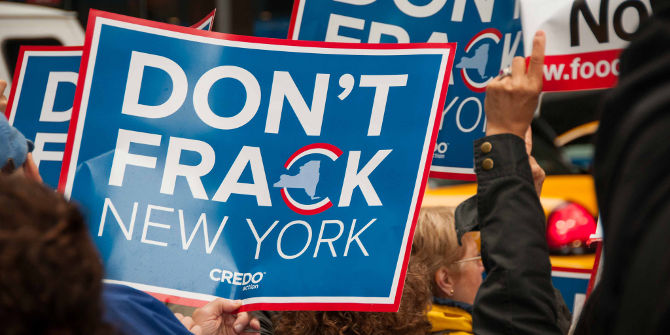USApp Managing Editor, Chris Gilson, looks at the best in political blogging from the Beltway. Our round-up of state blogs will follow on Saturday afternoon.
The Democratic Party, the GOP and elections
In November, America goes to the polls for the Congressional mid-term elections. On Sunday, Nate Silver of FiveThirtyEight gives its forecast for the U.S. Senate – that the Republicans are now slight favorites to recapture the chamber by winning at least six new seats. The following day, National Journal reports that the Democratic Party has issued a rebuttal to the prediction, saying that the pushback from the party is a testament to the influence that Silver wields, and the Democrats’ sensitivity concerning their grip on the Senate. Also on Monday, Roll Call’s Rothenblog says that recent surveys show that much of the Democrats’ Senate problems stem from Independents’ current leaning towards the GOP, as well as the potential for low turnout among Democratic voters. On Thursday, Daily Kos says that while things may look bad for the Democrats in the Senate for the mid-terms, in 2012 Republicans were similarly convinced that they would win the Senate, but their predicted majority fizzled out at the election.
FreakOutNation reports on Monday that a new report from the right-leaning National Taxpayer Union Foundation claims that Barack Obama is the most well-traveled and expensive in history. They say that the travel means that the President is engaging the U.S. as the global power that those on the right actually want it to be. After a recent narrow defeat by the Democratic candidate in a Florida special election, many commentators have accused the party as being in disarray over its Obamacare health insurance reform. Daily Kos takes these comments to task, writing that with polls showing support for the program, Democrats only need to worry about the GOP base who still want Obamacare to be scrapped.
Moving to the next presidential election in 2016, FiveThirtyEight says that the likely Democratic candidate, and former First Lady, Hillary Clinton is polling at 60 – 70 percent, like an incumbent, which bodes well for her chances in two years’ time. Meanwhile, The Atlantic writes on Wednesday that Clinton does not deserve a free pass from the media, who may be concerned about being seen as ‘Clinton-hating’. Does it seem like the presidential election is starting earlier every four years? National Journal shares that view, writing on Monday that an analysis of media coverage shows that the 2016 race has received more attention earlier than any other in living memory.

Looking at Republican hopefuls for 2016, on Sunday, Daily Kos says that it is entirely possible that GOP Senator, Rand Paul, may well be the next President. They write that Paul’s pragmatism on immigration reform and his opposition to government surveillance may help to make him an attractive populist in the eyes of many voters. United Liberty echoes this, saying that Rand Paul is the future of the GOP, writing that his libertarian ideals are influencing the conversation more than anyone else on the right. On Thursday, PoliticusUSA reports on a tweet from Paul, mocking President Obama for the National Security Agency’s surveillance program, while the President is visiting the Pope in Italy. They say the tweet shows a lack of respect for Obama and raises questions about Rand Paul’s maturity.
Moving to the Republican Party more generally, Roll Call writes on Monday on the influence of Texas Republicans on the GOP in Congress, saying that with 24 members (the largest delegation), it may be poised to wage a fight for the upper rungs of the House leadership. In light of Nate Silver’s predictions about the Senate in this year’s mid-term elections (mentioned above), The Atlantic asks on Wednesday, what if Republicans capture the Senate? They say that a GOP controlled Congress is likely to be more obstructive to legislation, thus potentially damaging the Republican brand. On Thursday, National Journal warns that victory in 2014 may give the GOP false hope for the 2016 presidential election. They say that they can win this year without having fixed their problems, including a lack of appeal to young, minority and female voters, and that a swing to the right in the lead up to the next presidential election is likely to hurt the party. Finally, United Liberty writes that young voters are now sceptical of both parties – not just the Democrats.
Government, the Beltway and Congress’ agenda
Last week the head of the Senate Intelligence Committee, Dianne Feinstein, spoke out against the CIA, accusing it of withholding documents to a Senate investigation into illegal torture, and spying on Senate staffers. The Atlantic writes that the hostilities between the CIA and Feinstein are actually a good thing – they show that the system of Senate oversight over agencies such as the CIA is working as it should. In another area of conflict between Congress and a government agency, The Foundry reports that the House Oversight and Government Reform Committee has met legal requirements to vote on holding former IRS official Lois Lerner in contempt of Congress for refusing to testify about alleged targeting of conservative groups by the IRS. Meanwhile, Crooks & Liars reports that the GOP has ‘wasted’ millions of dollars of taxpayer’s money in their investigations and hearings into the 2012 attacks in Benghazi, Libya.
This week also saw the Obama administration announce an overhaul of the National Security Agency’s phone records surveillance program. Red State is sceptical, saying that the changes would have to be approved by Congress first. Later in the week, after the announcement that the government will no longer collect telephone meta data, PoliticusUSA writes that Obama has done all he can to address a problem that was actually created by the Bush Administration.
On Monday, Daily Kos reports that the Obama Administration is becoming increasingly frustrated with GOP obstruction of judicial nominations in the Senate. They say that the Republicans are using a ‘silent filibuster’ by using the ‘blue slip’ tradition that allows home state Senators the power to approve in-state nominees. With gridlock still very much a part of American politics; The Monkey Cage has a timely piece on what President Lyndon Johnson can teach us about legislative success.
Moving to the House, on Tuesday, United Liberty reports that rumours of a Republican revolt against House Speaker John Boehner have resurfaced, with plans seemingly being floated to replace him at the beginning of the 114th Congress, after the mid-term elections. They say that many in the GOP are frustrated with Boehner’s handling of the recent budget deal and the push for immigration reform. Meanwhile, Crooks & Liars criticises Boehner for deciding not to bring a Senate bill to the House that would reinstate emergency unemployment benefits for 2 million people. They say that Boehner feels that the Senate plan is ‘unworkable’, despite the negative effects on those who no longer have benefits. On Wednesday, PoliticusUSA reports that a group of GOP Senators have joined in the criticism, saying that the Senate plan is a good compromise. Finally, this week also saw an attempt by House Democrats to force immigration reform to the floor by putting forward a discharge petition, according to Daily Kos. While the Democrats do not have the numbers for a successful vote, they may succeed in inspiring outside groups to push further for reforms, which may in turn influence the mid-term elections later this year.
On Saturday, FreakOutNation looks at campaign finance reform in the states (after the Supreme Court has severely weakened them at the federal level). They say one of the main problems is ‘dark money’, where large amounts of campaign spending comes from groups that do not disclose their donors. They discuss proposed state-level legislation in California and New York that will make campaign funding more transparent.
Foreign policy and defense
This week foreign policy commentary continued to centre on Russia’s actions in the Crimea in Ukraine. On Monday, Informed Comment reports on comments from former Presidential-candidate Mitt Romney that President Obama’s policies to Russia were ‘naive’, and also that his policies on Syria had emboldened Russia as well. They say that Romney is wrong, as Crimea was never a U.S. sphere of influence, and Russia sent troops into Georgian regions in the wake of U.S. invasions of Afghanistan and Iraq. This week the Senate considered an aid package for Ukraine – The Foundry reports that Senator Ted Cruz was leading the GOP’s fight against the package’s increase in support for the International Monetary Fund, saying that it would undermine U.S. influence in Ukraine. On Tuesday, Daily Kos writes that many ‘hawks’ have used the Russian incursion into Crimea as an excuse to call for the modernisation of U.S. nuclear forces, something which may have a trillion dollar price tag.
Affordable Care
This coming Monday is the deadline for enrolments into the Obama Administration’s signature health insurance program, known as Obamacare. With this in mind, The Foundry takes a pictorial walk down memory lane to look at delays to the program. On Monday, The Atlantic writes that most people disapprove of Obamacare, and perhaps even worse, a great deal of the uninsured do not understand it, nor that they have to get insurance this month or face a penalty. Perrspectives takes a more positive line, writing that Obamacare’s approval ratings are climbing, and the gap between those that disapprove and approve of the program is narrowing.

Obamacare faced two court challenges this week, writes Wonkblog. The first, involves two companies that argue that the new law’s contraception mandate violates business owners’ religious freedom, and the second challenges the ability for individuals in states with federal exchanges to access premium subsidies. They say if the first suits are successful, the effects on Obamacare would be minimal, only affecting contraception coverage, but if the second challenge is successful, then this would be a major blow to the law in the 36 states that use federal exchanges, as coverage would be much less affordable for many. Hit & Run writes on Tuesday that this latter challenge may well have a chance, as one of the judges may be sceptical of the government’s position.
On Tuesday, White House Dossier reports that the Obama Administration has decided to extend the Obamacare enrolment deadline, for those that have tried to enrol already, but have not been successful. Daily Kos writes on Wednesday, that despite GOP criticism of the move, it is not a ‘delay’, as it is aimed at those who have already begun the application process.
Some positive news for Obamacare came on Thursday, with the announcement that it had hit its end of March goal of 6 million enrolees early, writes PoliticusUSA. The Foundry, is sceptical however, asking just how many of those 6 million have paid premiums, are young, and in good health, the latter two aspects being very important to the program’s long-term success.
The economy and society
In the wake of the Hobby Lobby religious exemption challenge at the Supreme Court this week (see above), The Volokh Conspiracy takes an in-depth look at religious exemptions across the U.S., and their legal history. The Foundry writes on Sunday that whether or not people are conservative or liberal does not matter – we should believe in religious freedom, and that includes for businesses and in the workplace. Still on religion, Caffeinated Politics expresses concern that creationism is being taught in some private schools which are also receiving public subsidies.
On Tuesday, The Atlantic writes on the rise of the cashless economy, which has had one unexpected benefit: helping to decrease crime, as cash is important to the underground economy. Still on crime, Wonkblog reports on a new study that found no increases in crime in states that legalized medical marijuana. Crooks & Liars writes that week that America carried out 39 executions last year, saying that the number has been declining since 2009, and that the death-penalty debate has been changing, partly because of declining violent crime.
And finally…
Wonkblog carries a report of a study by evolutionary biologists that claims to have determined which dance movements are best able to catch a woman’s eye.
Roll Call’s Heard on the Hill says that House Minority Leader Nancy Pelosi made an ‘epic photobomb’ this week, giving pictorial evidence.
Outside the Beltway writes that astronomers, who announced they found a new dwarf planet in the outer solar system this week, have named it ‘Biden’, after the Vice President.
Featured image credit: Greg Peverill-Conti (Creative Commons BY NC SA)
Please read our comments policy before commenting.
Note: This article gives the views of the author, and not the position of USApp– American Politics and Policy, nor of the London School of Economics.
Shortened URL for this post: http://bit.ly/1gxWbM3






